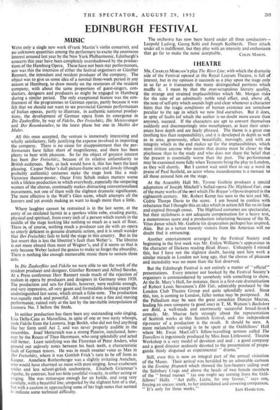EDINBURGH FESTIVAL
MUSIC WITH only a single new work (Frank Martin's violin concerto), and no unknown quantities among the performers to excite the enormous interest aroused last year by the New York Philharmonic, Edinburgh's concerts this year have been completely overshadowed by the produc- tions of the Hamburg Opera. These have not been star performances, nor was this the intention of either the festival organisers or Gunther Rennert, the intendant and resident producer of the company. The object was to give us some idea of a normal three-week period in any season at Hamburg, to draw mostly on the resources of the resident company, with about the same proportion of guest-singers, con- ductors, designers and producers as might be engaged in Hamburg during a similar period. The only exceptional feature was the con- finement of the programmes to German operas, partly because it was felt that we should not want to see provincial German performances of Italian operas, partly to illustrate, in authentic national produc- tions, the development of German opera from its emergence in Die Zauberfflite, by way of Fidelio, Der Freischiitz, Die Meistersinger and Der Rosenkavalier, to the latest phase but one in Mathis der Maier.
All this once accepted, the venture is immensely interesting and wholly satisfactory, fully justifying the expense involved in importing the company. There is no cause for disappointment that the per- formances have fallen short of magnificence, and there has been plenty to hear with pleasure. So far the object of greatest interest has been Der Freischiitz, because of its relative unfamiliarity to British audiences. But, as luck would have it, this has been the least pleasing. Caspar Neher's dull picture-frame sets and dowdy (though probably authentic) costumes make the stage look like a mid- Victorian theatre-poster: Oscar Fritz Schuh makes matters worse with a lifeless production in which everybody„especially the simpering women of the chorus, continually makes distracting conventionalised movements, not one of them with the slightest dramatic significance. The most effective is the Wolf's Glen scene, which attempts all the horrors and yet avoids making us want to laugh more than a little.
Where laughter cannot be restrained is in the last scene, at the entry of an etiolated hermit in a spotless white robe, exuding purity, physical and spiritual, from every inch of a person which stands in the middle of the stage looking like nothing so much as a sack of flour. There of course, nothing much a producer can do with an opera so utterly deficient in genuine dramatic action, and it is small wonder that Der Freischiitz fails to hold the stage in this country. But in the last resort this is less the librettist's fault than Weber's. The libretto is not more absurd than most of Wagner's, and if it seems so that is only because Weber lacked the genius to make us forget the absurdity. There is nothing like enough memorable music there to sustain three acts.
In Die Zauberfflite and Fidelio we were able to see the work of the resident producer and designer, Gunther Rennert and Alfred Siercke. At a Press conference Herr Rennert made much of the rejection of realism in opera by producers and designers in Gerinany since 1920. The production and sets for Fidelio, however, were realistic enough, and very impressive, all very gaunt and formidable-looking except the undistinguished last scene, which struck a false note. The production was equally stark and powerful. All round it was a fine and moving performance, ruined only at the last by the inevitable interpolation of Leonora No. 3 before the finale, In neither production has there been any outstanding solo singing. Lisa Della-Casa as Marcellina, in spite of one or two nasty whoops, stole Fidelio from the Leonora, Inge Borkh, who did not find anything like her form until Act 2, and was never properly audible in the ensembles. Josef Metternich was a strong Pizarro, outclassed, how- ever by the Rocco of Theo Herrmann, who sang splendidly and acted still better. Least satisfying was the Florestan of Peter Anders, who ground out unlovely notes between his back teeth, a characteristic fault of German tenors. He was in much sweeter voice as Max in Der Freischiitz, where it was Gottlob Frick's turn to be off form as Kaspar. Anneliese Rothenberger was a slightly irritating Annchen, who would have charmed us more with pure singing, fewer exuberant smiles and less school-girlish soubretterie. Elisabeth Grummer's Agathe, by contrast, had too little youthful vivacity, in either acting or singing. She was statuesque enough for an Isolde, and sang very carefully, with a beautiful line, unspoiled by the slightest hint of a slur, but with a caution in approaching some of her high notes that seemed to indicate some technical difficulty. The orchestra has now been heard under all three conductors— Leopold Ludwig, Georg Solti and Joseph Keilberth. Their attack under all is indifferent, but they play with an intensity and enthusiasm that go far to make the noise acceptable. COLIN MASON.


































 Previous page
Previous page